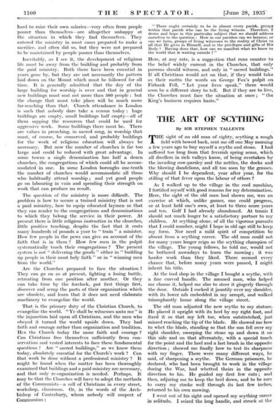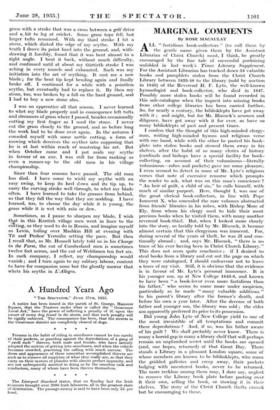THE ART OF SCYTHING
By SIR STEPHEN TALLENTS rpHE sight of an old man of eighty, scything a rough field with bowed back, sent me off one May morning a few years ago to buy myself a scythe and stone. I had suffered too long from that feverish spring sense, which all dwellers in rich valleys know, of being overtaken by the invading cow-parsley and the nettles, the docks and the blowing dandelions, and all too soon by the grasses: Why should I be dependent, year after year, for the stilling of that fever upon the labour of others ?
As I walked up to the village in the cool sunshine, I fortified myself with good reasons for my determination: Here, the sight of the old man had shown me, was an exercise at which, unlike games, one could progress, or at least held one's own, at least to three score yearS and ten. Golf I had already abandoned. At tennis I should not much longer be a satisfactory partner to my children. At scything alone, of all the vigorous pursuits that I could number, might I hope in old age still to keep my form. Nor need a mild spirit of competition be absent from a scything career. The old man could not for many years longer reign as the scything champion of the village. The young fellows, he told me, would not be bothered nowadays to learn the mowing ; it was harder work than they liked. There seemed every chance that, before many years were passed, I might inherit his title.
At the tool shop in the village I bought a scythe, with a fine curved handle. The amused man, who helped me choose it, helped me also to steer it gingerly through the door. Outside I cocked it jauntily over my shoulder, with its lower nib embedded in my armpit, and walked triumphantly home along the village street.
The old man adjusted the new scythe to my stature. He placed it upright with its heel by my right foot, and :fixed it so that my left toe, when outstretched, just missed reaching the tip of the blade. He showed me how to whet the blade, standing so that the sun fell over my right shoulder, sweeping the stone up and down it on this side and on that alternately, with a special touch for the point and the heel and a last brush in the opposite direction ; showed me finally how- to test its sharpness with my finger. There were many different ways, he said, of sharpening a scythe. The German prisoners, he declared, who had been brought to work in the village during the War, had whetted theirs in the opposite direction to his. He guided my first few cuts ; and then, adjuring me to keep the heel down, and to be sure to carry my stroke well through its last few inches, returned to his own mowing.
I went out of his sight and opened my scything career in solitude. I seized the long handle, and struck at the grass with a stroke that was a cross between a golf drive and a,- hit to leg at cricket. Some grass tops- fell,- but larger tufts remained. With my third stroke I hit a stone, which dinted the edge of my scythe. With my tenth I drove its point hard into the ground, and, with- drawing it forcibly, found that it was bent- almost to a right angle. I bent it back, without much difficulty, and continued until at about my thirtieth stroke I was aching in every muscle and exhausted. Such was my initiation into the art of scything. It cost me a new blade ; for the bent tip kept bending again and finally broke off. I continued for a while with a pointless. scythe, but eventually had to replace it. By . then my. stone, too, was broken by a fall on the hard ground, and I had to buy a new stone also.
I was an apprentice all that season. I never learned to whet my blade properly and in consequence left tufts and streamers of grass where I passed, besides occasionally cutting my first finger as I used the stone. I never cut the grass closely to the ground, and so before long the work had to be done over again. In the autumn I consoled myself with some nettle cutting, a form of mowing which deceives the scyther into supposing that he is at last within reach of mastering his art. But when October came and I put aside my scythe in favour of an axe, I was still far from ranking as even a runner-up to the old man in his village championship.
Since then four seasons have passed. The old man has died. I have come to wield my scythe with an easy swing, to keep its heel down and its tip up, to carry the curving stroke well through, to whet my blade often. I have learned to take the grasses from behind, so that they fall the way that they are nodding. I have learned, too, to choose the day while it is young, the grass while it is wet with rain or dew.
Sometimes, as I pause to sharpen my blade, I wish that in this Kentish village men went in lines to the cutting, as they used to do in Russia, and imagine myself as Levin, toiling over Mashkin Hill at evening with Tit and Prohor Yermilin setting- the pace: But then I recall that, as Mr. Hennell lately told us in his Change in the Farm, the cut of Cumberland men is sometimes twelve feet across, and the cut of Welshmen ten feet six. In such company, I reflect, my championship would vanish ; and I turn again to my solitary labour, content to have for companion none but the ghostly mower that whets his scythe in L'Allegro.







































 Previous page
Previous page